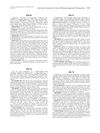 1 citations,
May 2021 in “BMC Proceedings”
1 citations,
May 2021 in “BMC Proceedings” The document concludes that more research is needed to reduce frequent hospital visits, addiction medicine education improves with specific training, early breast cancer surgery findings are emerging, nipple smears are not very accurate, surgery for older melanoma patients doesn't extend life, a genetic condition in infants can often be treated with one drug, doctors are inconsistent with blood clot medication, a certain gene may protect against cell damage, muscle gene overexpression affects many other genes, and some mitochondrial genes are less active in mice with tumors.
 November 2023 in “Dermatologic therapy”
November 2023 in “Dermatologic therapy” The scalp serum reduced scalp discomfort and symptoms without affecting skin moisture loss.
[object Object]  65 citations,
May 2010 in “Current Women's Health Reviews”
65 citations,
May 2010 in “Current Women's Health Reviews” Oxidative stress is a key factor in the development of Polycystic Ovary Syndrome, and weight management can improve symptoms.
 44 citations,
January 2021 in “Dermatologic Therapy”
44 citations,
January 2021 in “Dermatologic Therapy” COVID-19 may cause hair loss due to infection stress or treatments.
 1 citations,
September 2013 in “Elsevier eBooks”
1 citations,
September 2013 in “Elsevier eBooks” Hair ages and thins due to factors like inflammation and stress, and treatments like antioxidants and hormones might improve hair health.
 280 citations,
July 2018 in “Antioxidants”
280 citations,
July 2018 in “Antioxidants” Treatments that reduce oxidative stress and fix mitochondrial problems may help heal chronic wounds.
 March 2013 in “Molecular & Cellular Toxicology/Molecular & cellular toxicology”
March 2013 in “Molecular & Cellular Toxicology/Molecular & cellular toxicology” m-Aminophenol in hair dye can cause skin cell toxicity and stress responses.
October 2022 in “Biomedicines” Finasteride in male rats causes liver and metabolic issues in their offspring.
 2 citations,
January 2011 in “Andrologia”
2 citations,
January 2011 in “Andrologia” Flutamide and a new synthetic steroid affected brain and prostate chemicals and showed potential for treating androgen-related conditions and epilepsy.
23 citations,
July 2021 in “Life” Blue light can help treat skin conditions like eczema and acne without major side effects.
[object Object]  August 2019 in “Journal of Invertebrate Pathology”
August 2019 in “Journal of Invertebrate Pathology” Thymosin beta 4 protects cells from damage by blocking a harmful microRNA and boosting a protective gene.
 80 citations,
April 2011 in “Plant physiology”
80 citations,
April 2011 in “Plant physiology” White lupin uses specific genes to grow root hairs and access phosphorus when it's scarce.
17 citations,
April 2021 in “Frontiers in Pharmacology” Activating Nrf2 can help protect against hearing loss.
 July 2023 in “bioRxiv (Cold Spring Harbor Laboratory)”
July 2023 in “bioRxiv (Cold Spring Harbor Laboratory)” Chitosan slows root hair growth and causes a buildup of callose at low concentrations, but at high concentrations, it only inhibits growth without callose buildup.
 75 citations,
January 2009 in “International journal of trichology”
75 citations,
January 2009 in “International journal of trichology” Hair grays due to oxidative stress and fewer functioning melanocytes.
 October 2023 in “Research Square (Research Square)”
October 2023 in “Research Square (Research Square)” Oxidative stress is linked to mild patchy alopecia areata.
 3 citations,
November 2018 in “Journal of cellular physiology”
3 citations,
November 2018 in “Journal of cellular physiology” Serenoa repens and N-acetyl glucosamine/milk proteins complex may help with hair growth and prevent hair loss.
 July 2021 in “Open access journal of biomedical science”
July 2021 in “Open access journal of biomedical science” A lotion with natural extracts significantly sped up hair growth in women with hair loss from chemotherapy.
15 citations,
November 2018 in “Current radiopharmaceuticals” Melatonin can help prevent and treat skin damage caused by gamma rays.
 1 citations,
April 2023 in “bioRxiv (Cold Spring Harbor Laboratory)”
1 citations,
April 2023 in “bioRxiv (Cold Spring Harbor Laboratory)” Climate-related nutritional stress may cause hair loss in juvenile male Guadalupe fur seals.
March 2024 in “Antioxidants” Excessive blue light harms eye cells and disrupts sleep patterns.
 August 2024 in “Drug Design Development and Therapy”
August 2024 in “Drug Design Development and Therapy” Decursin shows promise for treating cancer, neuroprotection, inflammation, and hair loss.
 11 citations,
February 2005 in “Clinical pharmacology and therapeutics/Clinical pharmacology & therapeutics”
11 citations,
February 2005 in “Clinical pharmacology and therapeutics/Clinical pharmacology & therapeutics” Hair cortisol could be a marker for chronic stress in pregnancy, but depression affects cortisol levels differently.
 August 2022 in “International Journal of Health Sciences (IJHS) (En línea)”
August 2022 in “International Journal of Health Sciences (IJHS) (En línea)” Oxidative stress is important in causing alopecia areata.
May 2024 in “Molecules/Molecules online/Molecules annual” Plant extracts can help prevent hair loss and promote hair growth.
 June 2021 in “Psychiatria Danubina”
June 2021 in “Psychiatria Danubina” The antidepressant escitalopram likely caused hair loss in a patient.
 December 2022 in “Türk biyokimya dergisi”
December 2022 in “Türk biyokimya dergisi” The conclusions are: fecal short-chain fatty acids may help prevent cancer, fiber intake can reduce obesity, weight loss is hard for obese people, low BMI cancer patients are more prone to chemotherapy side effects, intermittent fasting benefits gut health, cherry laurel has health benefits in rats, certain gene variations can increase stress in hair loss patients, fecal acids can affect blood sugar levels, cold agglutinin can affect blood test results in autoimmune patients, and people with Crohn's disease have higher levels of a certain chemical in their blood.
1 citations,
January 2023 in “PubMed” Urtica dioica extract may help treat androgenic skin diseases by reducing a specific gene's activity.
 February 2023 in “Frontiers in Bioengineering and Biotechnology”
February 2023 in “Frontiers in Bioengineering and Biotechnology” Optical imaging and light therapy show promise for diagnosing and treating liver injury caused by surgery.
 August 2024 in “Plant Signaling & Behavior”
August 2024 in “Plant Signaling & Behavior” OsPRX83 helps rice survive stress by improving stress response and antioxidant activity.






















